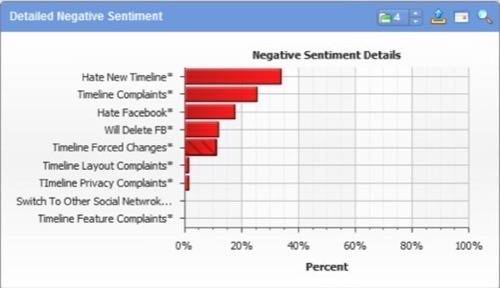The Associated Press reports that millions of people are resisting pressure to sign up for Facebook, and a new study suggests that 93% of users “hate” the relatively new Timeline – with some even threatening to quit.

But before you call your broker and cancel your order in tomorrow’s initial public offering of Facebook shares, consider this: It doesn’t matter.
The slowing growth of user numbers and the fact that some people are holding out should not be surprising. At some point, Facebook will likely saturate all of the markets it enters, and without opening new markets like China, it will not see the rapid growth that marked its first eight years. And even as growth slows, Facebook still has about half of all Internet users signed up, and accounted for nearly one in 10 of all U.S. Internet visits last month.
The Timeline study by Attensity is more troubling at first glance. The company used its text analytics software to scan 138,572 Facebook posts about Timeline and found that 93% of them contained negative sentiment, ranging from “Timeline complaints” to the seemingly more damning “switch to another social network” and “will delete Facebook.”

Attensity did not give specific dates of when the study was conducted, saying only that the comments were analyzed over a six-week period that included March 31, when brands were required to switch over to Timeline. The study results also didn’t indicate whether users made good on their threats to leave Facebook.
That’s a crucial bit of information, because in the past Facebook has waited out initial criticism of changes; users eventually adopt and even embrace them. Indeed, when Facebook first started rolling out Timeline last fall, many complained about the loss of features that had been the target of complaints when Facebook did a major redesign in December 2010.
And even if people do quit, chance are good they will come back; by one estimate, as many as two-thirds of people who deactivate their Facebook accounts eventually rejoin the service.
The Attensity study, the Associated Press article and, frankly, this post are all doing the same thing: Taking advantage of the big buzz around Facebook’s IPO. But everyone knows Facebook is big and will remain big for the foreseeable future. The key, and the only story that really matters at this point, is whether Facebook can find a way to change those big user numbers into big revenue numbers.
















